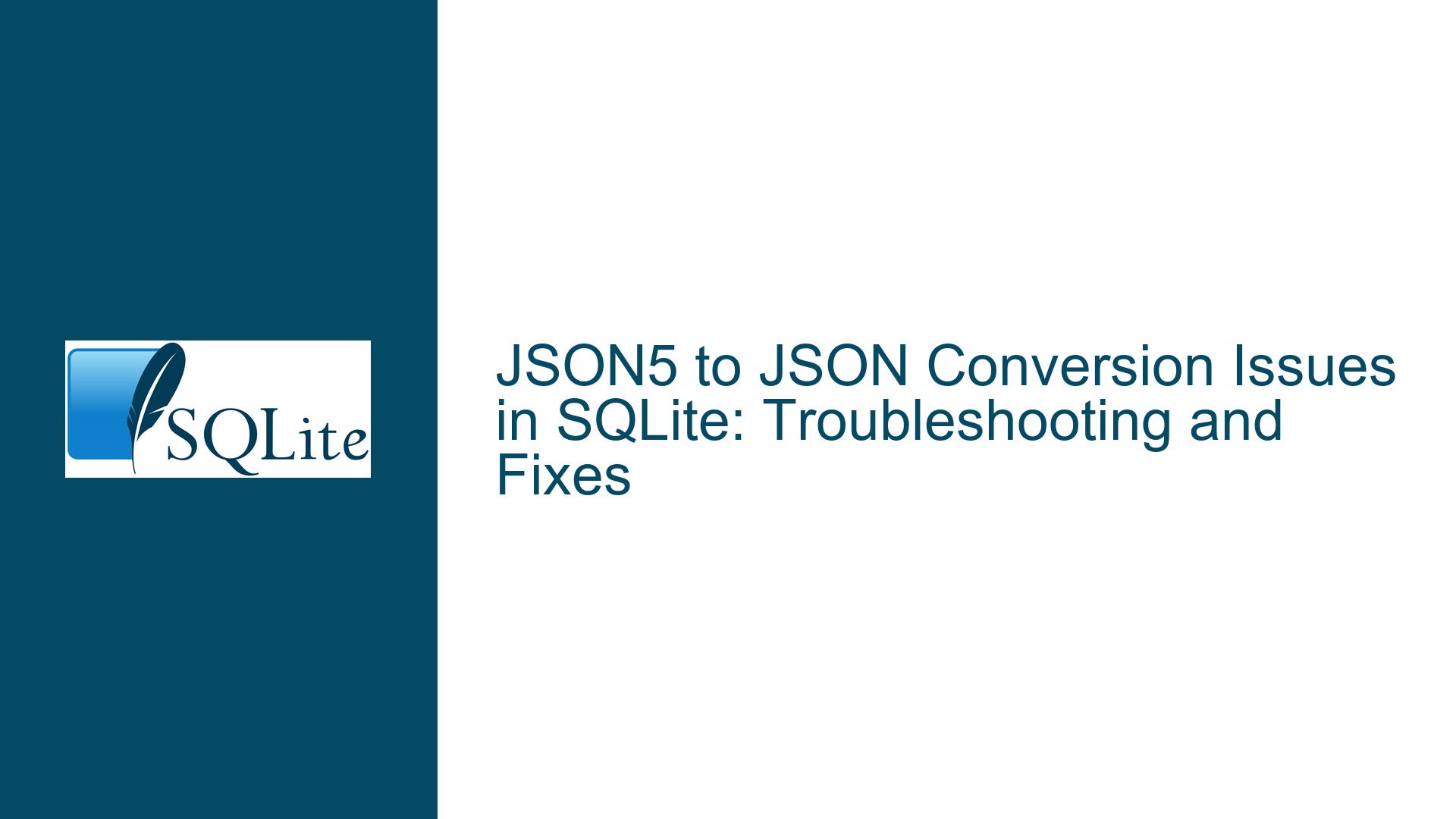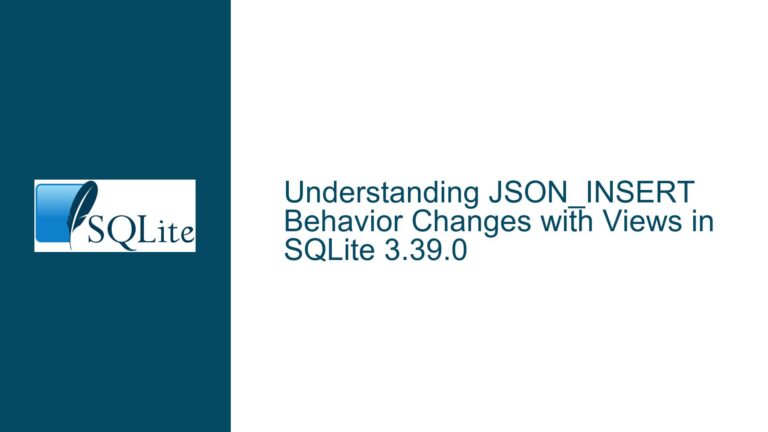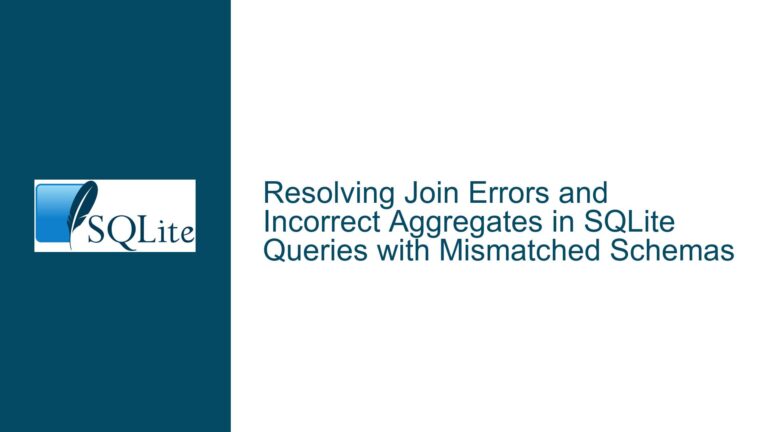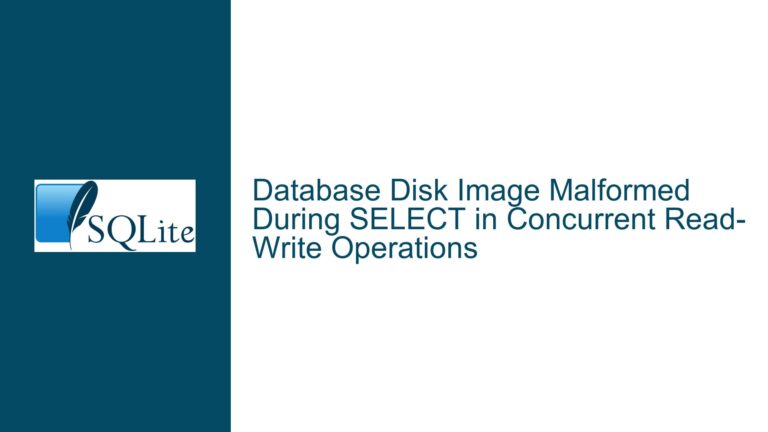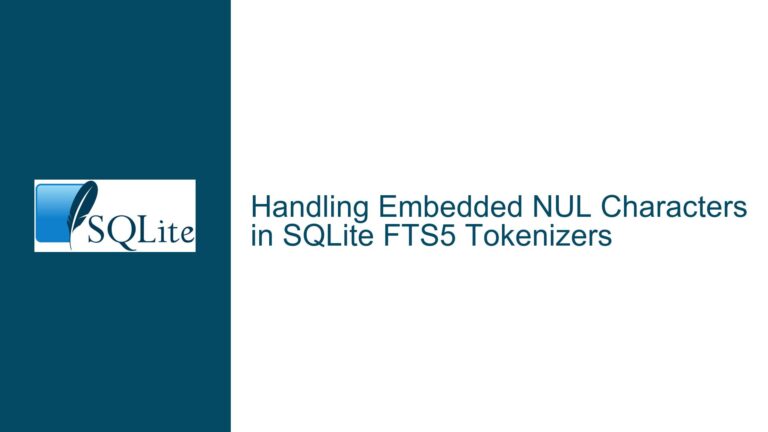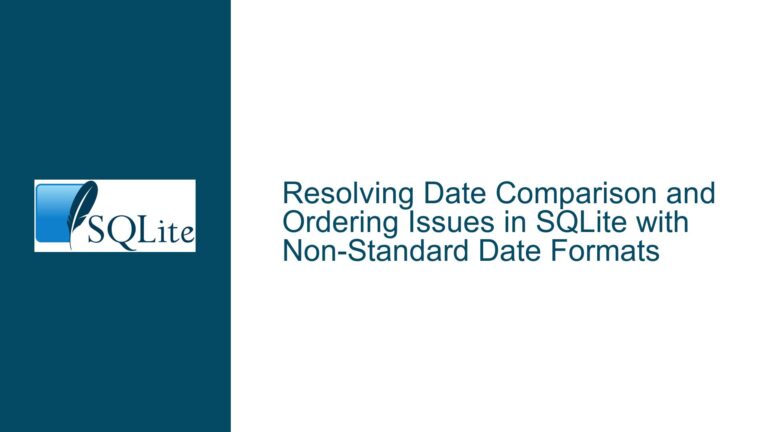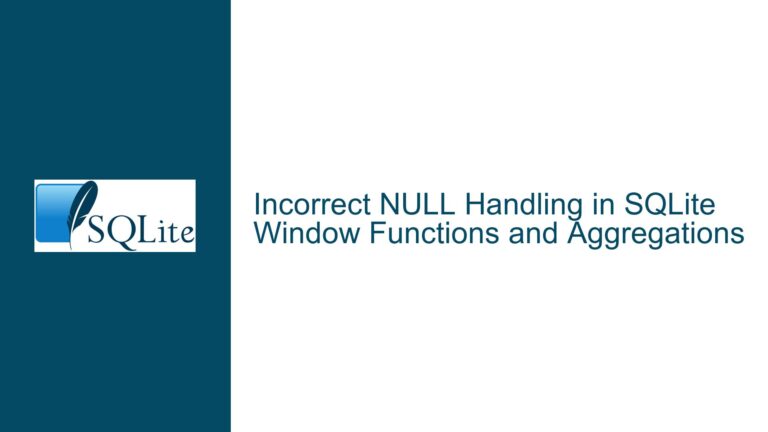JSON5 to JSON Conversion Issues in SQLite: Troubleshooting and Fixes
Issue Overview: JSON5 Parsing and Conversion to Canonical JSON in SQLite
The core issue revolves around the behavior of SQLite’s json() function when handling JSON5 strings, particularly those containing embedded quotes. JSON5 is a superset of JSON that allows for more relaxed syntax, such as unquoted keys, single quotes, and trailing commas. However, SQLite’s json() function is designed to work with canonical JSON, which adheres to stricter syntax rules. The problem arises when JSON5 strings, which are valid in their own right, are passed to the json() function and result in outputs that are neither valid JSON nor JSON5.
The issue manifests in several ways:
- The
json()function converts valid JSON5 strings into outputs that are not valid canonical JSON. For example, a JSON5 string with embedded quotes ("Valid "JSON5" string") is converted into an invalid JSON string ("Valid "JSON5" string"), which fails validation when checked withjson_valid(). - The
json()function does not consistently error or returnNULLwhen given invalid JSON strings. Instead, it sometimes processes these strings without raising an error, leading to unexpected behavior in downstream operations. - The
json_extract()function exhibits similar inconsistencies when handling JSON5 strings. It returns strings that are not valid JSON, even when the input is valid JSON5.
These issues are particularly problematic for developers who rely on SQLite’s JSON functions to parse and manipulate JSON data, especially when the data originates from sources that use JSON5 syntax. The inconsistencies can lead to silent failures, incorrect data processing, and challenges in debugging.
Possible Causes: JSON5 Parsing Logic and Canonical JSON Conversion
The root cause of the issue lies in the parsing logic of the json() function and its handling of JSON5 syntax. SQLite’s JSON functions are designed to work with canonical JSON, which requires strict adherence to the JSON specification. However, JSON5 introduces additional syntax rules that are not fully compatible with canonical JSON. When the json() function encounters JSON5 strings, it attempts to convert them into canonical JSON, but this conversion process is not robust enough to handle all edge cases.
One specific problem is the handling of embedded quotes in JSON5 strings. In JSON5, strings can be enclosed in single quotes, and embedded quotes do not need to be escaped. However, in canonical JSON, strings must be enclosed in double quotes, and embedded quotes must be escaped. The json() function does not correctly escape embedded quotes when converting JSON5 strings to canonical JSON, resulting in invalid JSON output.
Another issue is the lack of proper error handling when invalid JSON strings are passed to the json() function. Instead of raising an error or returning NULL, the function sometimes processes these strings, leading to unexpected behavior. This inconsistency can make it difficult for developers to identify and handle errors in their JSON data.
The behavior of the json_extract() function is also affected by these issues. When extracting values from JSON5 strings, the function returns strings that are not valid JSON, even when the input is valid JSON5. This can lead to confusion and errors when the extracted values are used in further JSON operations.
Troubleshooting Steps, Solutions & Fixes: Addressing JSON5 Parsing and Conversion Issues
To address these issues, developers can take several steps to ensure that JSON5 strings are correctly parsed and converted into canonical JSON in SQLite. These steps include validating JSON5 strings before processing, using custom functions to handle JSON5 syntax, and leveraging SQLite’s built-in functions to ensure proper JSON formatting.
Validate JSON5 Strings Before Processing: Before passing JSON5 strings to the
json()function, developers should validate the strings to ensure they conform to JSON5 syntax. This can be done using a JSON5 validator or a custom validation function. If the string is not valid JSON5, it should be rejected or corrected before further processing.Use Custom Functions to Handle JSON5 Syntax: Developers can create custom SQL functions to handle JSON5 syntax and convert it into canonical JSON. These functions can be implemented using SQLite’s
CREATE FUNCTIONstatement and can include logic to properly escape embedded quotes and handle other JSON5-specific syntax. For example, a custom function could be created to convert single-quoted strings into double-quoted strings and escape embedded quotes.Leverage SQLite’s Built-in Functions for JSON Formatting: SQLite provides several built-in functions for working with JSON data, including
json_valid(),json_error_position(), andjson_extract(). Developers can use these functions to validate JSON strings, identify errors, and extract values. When working with JSON5 strings, developers should use these functions to ensure that the output is valid canonical JSON.Update to the Latest Version of SQLite: The issue with JSON5 parsing and conversion has been addressed in recent check-ins to the SQLite codebase. Developers should update to the latest version of SQLite or use the WASM build available at https://sqlite.org/fiddle to verify that the problem has been fixed. Updating to the latest version ensures that any bugs or inconsistencies in the JSON functions have been resolved.
Test JSON5 Strings with
json_valid()andjson_error_position(): Before processing JSON5 strings, developers should test them with thejson_valid()andjson_error_position()functions to ensure they are valid JSON. If the strings are not valid, thejson_error_position()function can be used to identify the location of the error, allowing developers to correct the issue.Handle Embedded Quotes in JSON5 Strings: When working with JSON5 strings that contain embedded quotes, developers should ensure that the quotes are properly escaped when converting to canonical JSON. This can be done using a custom function or by manually escaping the quotes before passing the string to the
json()function.Use
json_extract()with Caution: When using thejson_extract()function with JSON5 strings, developers should be aware that the function may return strings that are not valid JSON. To ensure that the extracted values are valid JSON, developers should validate the output usingjson_valid()and correct any issues before further processing.Consider Using a JSON5 Parser: For complex JSON5 strings, developers may consider using a dedicated JSON5 parser to convert the strings into canonical JSON before processing them in SQLite. This approach ensures that the JSON5 syntax is correctly handled and that the resulting JSON is valid.
By following these steps, developers can address the issues with JSON5 parsing and conversion in SQLite and ensure that their JSON data is correctly processed and validated. These solutions provide a robust approach to handling JSON5 syntax and avoiding the pitfalls associated with invalid JSON output.
In conclusion, the issues with JSON5 parsing and conversion in SQLite stem from the incompatibility between JSON5 syntax and canonical JSON. By validating JSON5 strings, using custom functions, leveraging SQLite’s built-in functions, and updating to the latest version of SQLite, developers can ensure that their JSON data is correctly processed and validated. These steps provide a comprehensive approach to troubleshooting and resolving the issues, ensuring that JSON5 strings are correctly converted into canonical JSON and that any errors are promptly identified and corrected.
